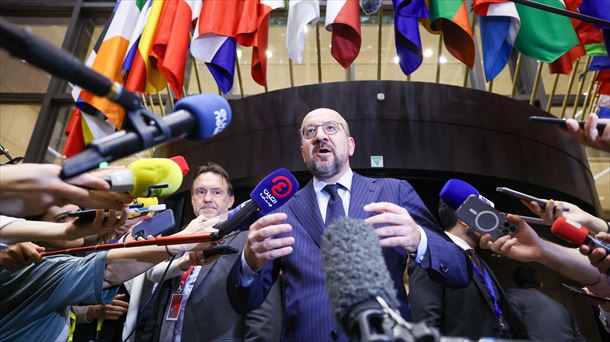The 27 will meet again in 10 days at a formal summit in which a decision is expected to be made. Von der Leyen, Costa and Kallas are the only names who are eligible to lead the Commission, the Council and Diplomacy, although the popular ones ask for more weight in the Council, with half a mandate for them.
The informal summit of heads of State and Government of the European Union (EU) to negotiate the renewal of the EU leadership has concluded tonight without an agreement on the names to occupy the four institutional positions at stake.
The leaders of the 27 will try again at their now formal summit, scheduled for next week (June 27 and 28).
Although this Monday’s meeting was planned as a first exchange of points of view on the negotiation, several names arrived at the table with the support of a majority of leaders: the German Ursula von der Leyen for the European Commission, Portuguese Antonio Costa for the European Council and Estonia Kaja Kallas as High Representative of the European Union for Foreign Affairs and Security Policy.
Furthermore, and despite the fact that the EU leaders do not elect the president of the European Parliament, they were expected to indicate that he would preferably be a representative of the European People’s Party, thus paving the way for the re-election of the Maltese Roberta Metsola at the head of this institution.
The president of the European Council, the Belgian Charles Michel, stated that the dinner had been “a good occasion to exchange points of view” on the results of the elections and to prepare for the formal summit next week, in which the leaders Yes, they must reach an agreement on institutional renewal.
Upon leaving the meeting, the acting Prime Minister of the Netherlands, Mark Rutte, assured that “everything is much clearer” than in 2019, in the last institutional renewal, when “everything was up in the air for three days.”
The EPP calls for dividing the European Council into two mandates
The European People’s Party (EPP) has formally proposed a change to the traditional structure of positions: that the Presidency of the European Council, to which the social democrats aspire entirely, be divided into two terms of two and a half years so that they can stay with one of them. It is the same format that is followed in the Presidency of the European Parliament. The proposal has not been accepted.
While Von der Leyen and Metsola seem to be the most stable sector of the “pool”, there are more doubts with Costa – whom the popular Italians, part of the government coalition in Rome, question for not supporting Ukraine enough – and with Kallas, of whom the European governments closest to the Kremlin, such as Slovakia or Hungary, have reluctance.
However, if one of the names fails, the entire group could decline, since a certain balance of gender, geographical origin and political color must be respected.
Source: Eitb
I am Michael Melvin, an experienced news writer with a passion for uncovering stories and bringing them to the public. I have been working in the news industry for over five years now, and my work has been published on multiple websites. As an author at 24 News Reporters, I cover world section of current events stories that are both informative and captivating to read.

